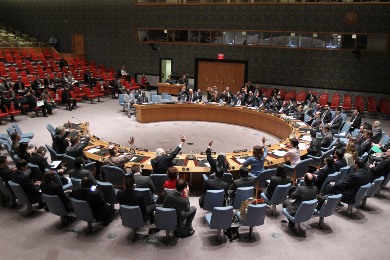U.N envoy warns of election risks in war-torn South Sudan
AUGUST 27, 2017 (JUBA) – The United Nations special envoy for South Sudan warned that the young nation could face more problems if issue affecting it are not tackled prior to next year’s general polls.

He added, “Our engagements with South Sudanese interlocutors, including the opposition, suggest that battlefield fortunes continue to inform the calculus of both the government and its opponents.”
Early this month, South Sudan President Salva Kiir called upon the country’s opposition groups to prepare for the country’s general elections, earmarked to take place after the end of the Transitional Government of National Unity (TGoNU) period in 2018.
To fast track processes leading to the polls, President Kiir in May officially declared his national dialogue initiative and declared unilateral cease-fire with rebels, albeit it has repeated been violated.
Tens of thousands of people have been killed and over two million displaced in South Sudan’s conflict triggered by political differences between President Kiir, a Dinka, and his former deputy, Riek Machar.
Haysom, however, said President Kiir’s reconciliation approach has not yielded any gains as fighting continue in various parts of the country.
“[The incidences of violence] may well contribute to deepening and extending the conflict,” Haysom further told the 15-member Council.
Meanwhile, the Former Botswana President Festus Mogae, who heads the Joint Monitoring and Evaluation Commission (JMEC) of the August 2015 peace agreement, told Security Council members that they must speak with one voice to the leaders of South Sudan.
“There should be clear consequences for intransigent groups, spoilers and violators,” he observed.
On Thursday, Mogae said the second anniversary of the signing of the Agreement on the Resolution of the Conflict in South Sudan (ARCSS) passed with “little meaningful progress” made in the implementation of the accord inked in Addis Ababa in 2015.
“Our perception at the time of the signing of the Peace Agreement in August 2015 was that it had ended a tragic internal conflict that had threatened to tear Africa’s youngest nation apart and it was hoped that disagreements amongst the parties over substantive issues had been resolved,” he remarked.
JMEC was established by terms decreed under Chapter Seven of the ARCSS, signed on 17 August 2015 in Ethiopia. Under the terms of the agreement, JMEC shall be responsible for monitoring, overseeing and supporting the implementation of the agreement and the mandate and tasks of the TGoNU, including adherence of the parties to agreed timelines and schedules; and in the event of non-compliance, shall recommend appropriate corrective action to the TGoNU.
JMEC is responsible for overseeing the work of CTSAMM (Ceasefire and Transitional Security Monitoring Mechanism), EFMA (Economic and Financial Management Authority), and other transitional institutions created by the Agreement.
According to Mogae, by now the 2015 peace accord should have achieved considerable progress towards improved security and governance in the war-torn East African nation.
(ST)
